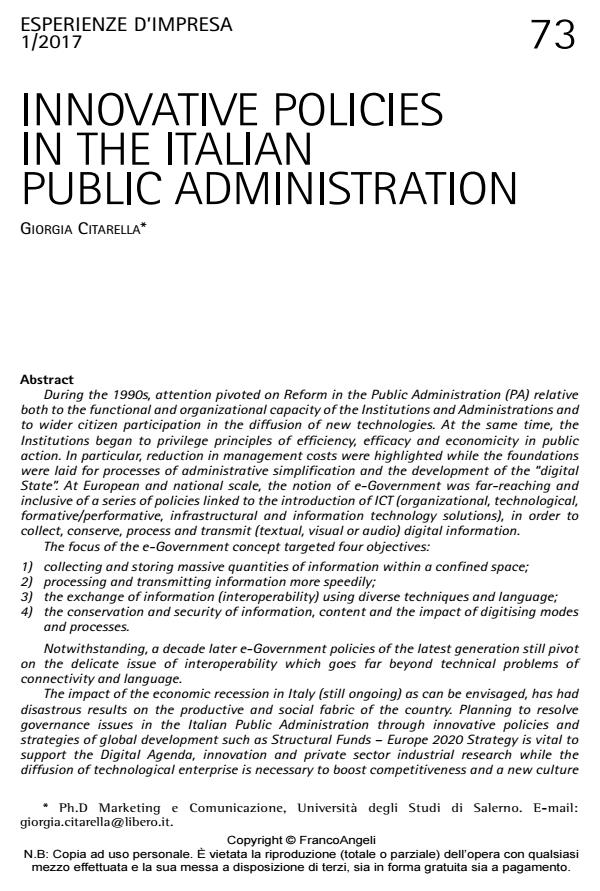Innovative policies in the Italian public administration
Journal title ESPERIENZE D'IMPRESA
Author/s Giorgia Citarella
Publishing Year 2018 Issue 2017/1
Language English Pages 25 P. 73-97 File size 190 KB
DOI 10.3280/EI2017-001004
DOI is like a bar code for intellectual property: to have more infomation
click here
Below, you can see the article first page
If you want to buy this article in PDF format, you can do it, following the instructions to buy download credits

FrancoAngeli is member of Publishers International Linking Association, Inc (PILA), a not-for-profit association which run the CrossRef service enabling links to and from online scholarly content.
During the 1990s, attention pivoted on Reform in the Public Administration (PA) relative both to the functional and organizational capacity of the Institutions and Administrations and to wider citizen participation in the diffusion of new technologies. At the same time, the Institutions began to privilege principles of efficiency, efficacy and economicity in public action. In particular, reduction in management costs were highlighted while the foundations were laid for processes of administrative simplification and the development of the "digital State". At European and national scale, the notion of e-Government was far-reaching and inclusive of a series of policies linked to the introduction of ICT (organizational, technological, formative/performative, infrastructural and information technology solutions), in order to collect, conserve, process and transmit (textual, visual or audio) digital information. The focus of the e-Government concept targeted four objectives: 1) collecting and storing massive quantities of information within a confined space; 2) processing and transmitting information more speedily; 3) the exchange of information (interoperability) using diverse techniques and language; 4) the conservation and security of information, content and the impact of digitising modes and processes. Notwithstanding, a decade later e-Government policies of the latest generation still pivot on the delicate issue of interoperability which goes far beyond technical problems of connectivity and language. The impact of the economic recession in Italy (still ongoing) as can be envisaged, has had disastrous results on the productive and social fabric of the country. Planning to resolve governance issues in the Italian Public Administration through innovative policies and strategies of global development such as Structural Funds - Europe 2020 Strategy is vital to support the Digital Agenda, innovation and private sector industrial research while the diffusion of technological enterprise is necessary to boost competitiveness and a new culture of systemic actions to foster structural impact. Within this strategic vision, one of the core issues concerns a more virtuous alignment with European policies, well defined in the Strategy Horizon 2020, the main European Union funding tool for Research Europa envisaged for the period 2014-2020.
Keywords: Innovation, E-Government, ICT, Italian Public Administration.
Giorgia Citarella, Innovative policies in the Italian public administration in "ESPERIENZE D'IMPRESA" 1/2017, pp 73-97, DOI: 10.3280/EI2017-001004